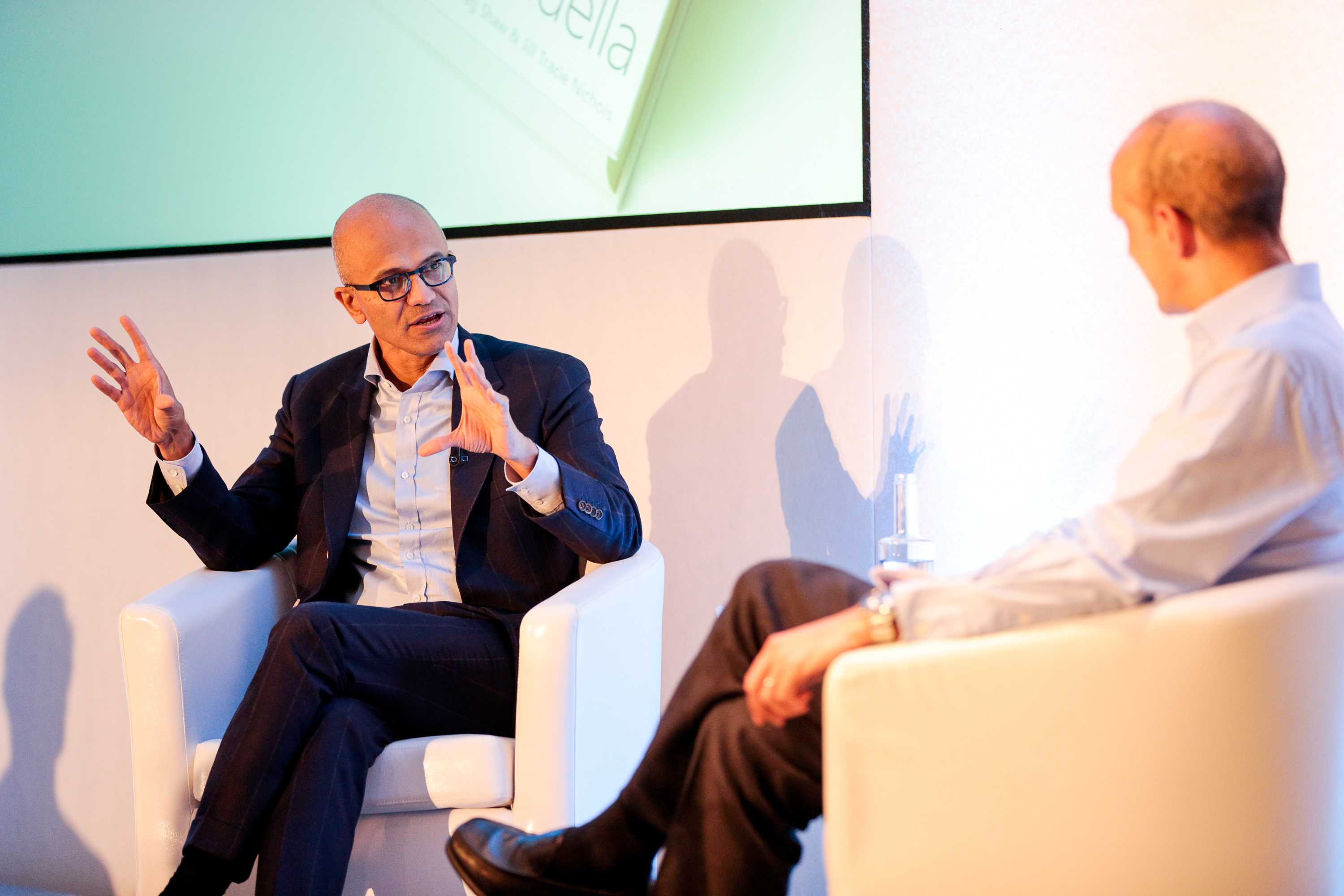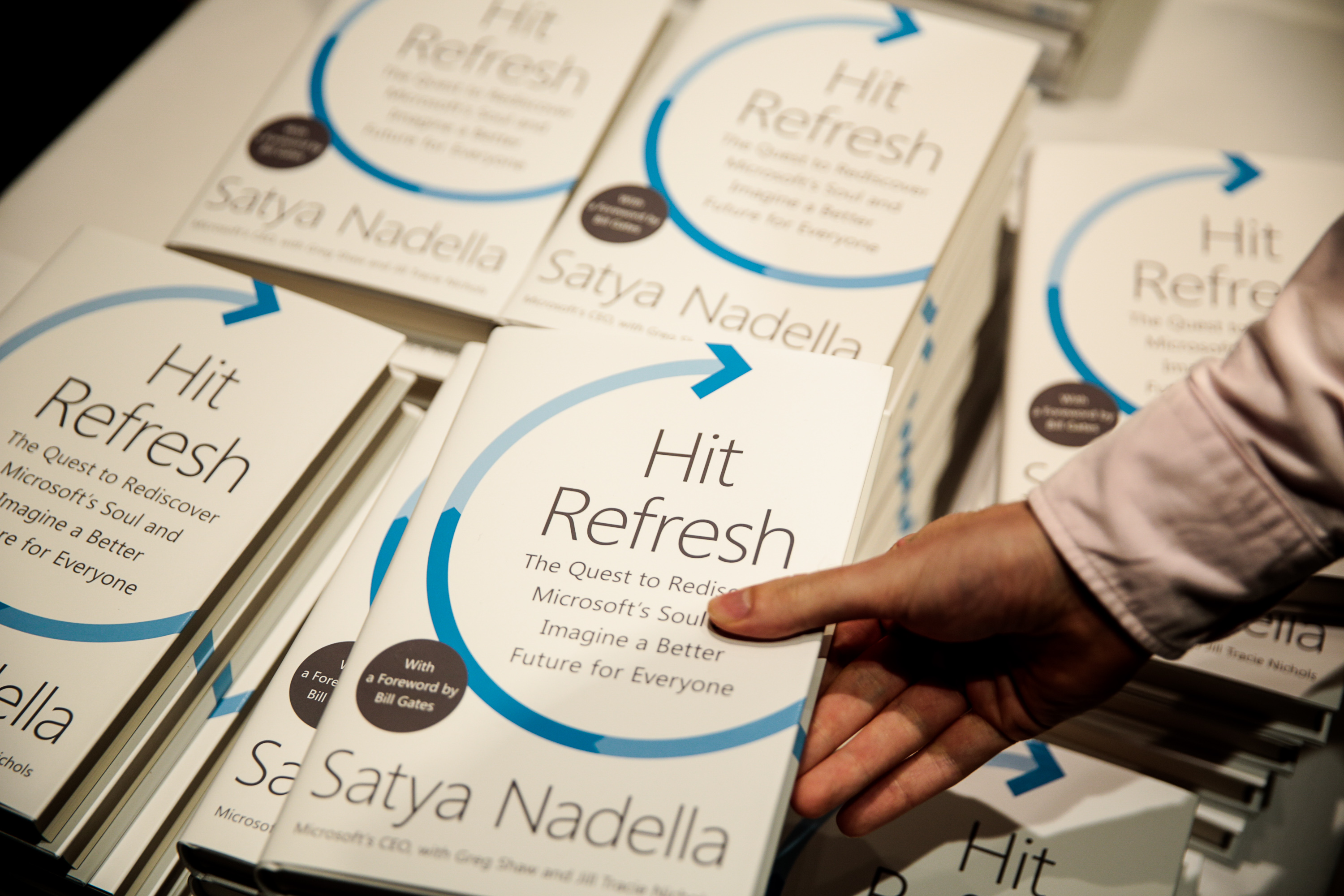
AI must be built with empathy, Microsoft CEO Satya Nadella says during UK release of book Hit Refresh
Empathy must be embedded in artificial intelligence from the moment it is created to ensure it becomes a positive force in people’s lives, Satya Nadella has said.
Speaking at two events in London that coincided with the release of his book, Hit Refresh, the Chief Executive of Microsoft said new technology will have a “profound impact on our daily lives and do good” but companies must also be mindful of “unintended consequences”.
By ensuring the first wave of AI empowered humanity to achieve more, the technology that follows would be more likely to be a force for good, too, he added.
“I believe in a world that will have an abundance of artificial intelligence, but what will be scarce is real intelligence and human qualities, like empathy,” Nadella said. “I think great innovation comes from the empathy you have for the problems you want to solve for people.
“We need to take accountability for the AI we create. I think a lot about this. With any new technology we, as a society, have to be clear-eyed on both sides of it – the opportunities for this technology to have a profound impact on our daily lives and do good, and at the same time be very mindful of unintended consequences.
“I am focused on all the practical things we can do as creators of AI. I believe it’s a design choice. We want to create AI that empowers humans and make that a core, conscious design decision.”
Nadella pointed out that some of Microsoft’s best-known products have empathy at their core.

Satya Nadella, Microsoft CEO, bowls at Lord’s
“I look back and ask myself: ‘when did we create our best products?’. Beyond having a culture that was a learn-it-all culture rather than a know-it-all culture, one of the things we also had was a deep sense, an intuition, of the unmet and unarticulated needs of our customers. Where does that come from? I believe the best source of it is empathy.”
It’s a key theme in Hit Refresh, which focuses on individual change, the transformation happening inside Microsoft and new technology such as AI. Nadella also covers growing up in Hyderabad, India, his love of cricket, emigrating to the US, “growing up” in Microsoft and becoming only the third CEO in the company’s 42-year history.
During an Intelligence Squared event at the Emmanuel Centre in Westminster and a separate talk at Lord’s Cricket Ground, Nadella spoke about his own “Hit Refresh” moment that made him pause and reassess his life.

Satya Nadella talks to journalist Matthew Syed at Lord’s
“If you had asked me an hour before my son’s birth what I was thinking about, it was: is the nursery ready, is Anu [Nadella’s wife] going to get back to her job as an architect, what will weekends be like? Then everything changed. Zain was born with severe brain damage, which led to Cerebral Palsy,” the 50-year-old said.
“As soon as Anu got out of hospital she was driving him to therapy after therapy; everything that came so naturally to her to give Zain the best chance, didn’t come to me. I was thinking about what happened to me, what happened to my plans, why did this happen. It took me two years or more to internalise that nothing had happened to me, something had happened to Zain, and I had to step up and see the world through his eyes and do my job as his father. I now understand that.
“The process wasn’t linear, it was tumultuous, but it certainly shaped who I am. It gave me a better sense of seeing things through others’ eyes, whether it’s people who work with me or customers. It was perhaps the ‘Hit Refresh’ moment in my life.”
The empathy Nadella discovered “grounded and centred” him. The trait has been a recurring theme throughout his 25 years at the company – even emerging during his Microsoft job interview in 1992. He spent eight hours solving algorithmic and computer science puzzles before being called in for a face-to-face chat.

Hit Refresh, by Satya Nadella
Nadella was asked a series of questions before facing one that threw him completely off-guard. “What would you do if you see a baby that’s fallen on the street?” the interviewer said. Nadella thought for a couple of minutes before responding. “I would call 911,” he said. The interviewer got up, walked Nadella out of the office and put his arm around him. “If you see a baby on the street, you pick him up and hug him,” he said.
Nadella left the interview convinced he wouldn’t get the job. Just under a quarter of a century later, he was CEO.
During the three years Nadella has spent as head of Microsoft, he has created a “growth mindset” culture, while key areas such as the Azure cloud platform have thrived and the company has pushed the boundaries of technology with the HoloLens mixed-reality headset.
The future, he said, would see huge advances in quantum computing – a revolutionary concept that can unleash never-before-seen levels of computing power. Microsoft recently announced that it has created a programming language that would allow developers to run quantum simulators on their own machines.
“There are a lot of computational problems we [humans] can’t solve. We can’t model an enzyme in natural food production, for example. If you try to solve it using a classical computer, it will take as much time as from the Big Bang to now.
“Think of a maze. With the classic computer you would take a path, find a dead-end, turn back and try another path. Using quantum computing, you can try all the paths at the same time.
“We need a new approach to problems, and we are well on our way to bringing together the maths, the physics and the computer science. The world needs Microsoft to do that.”

